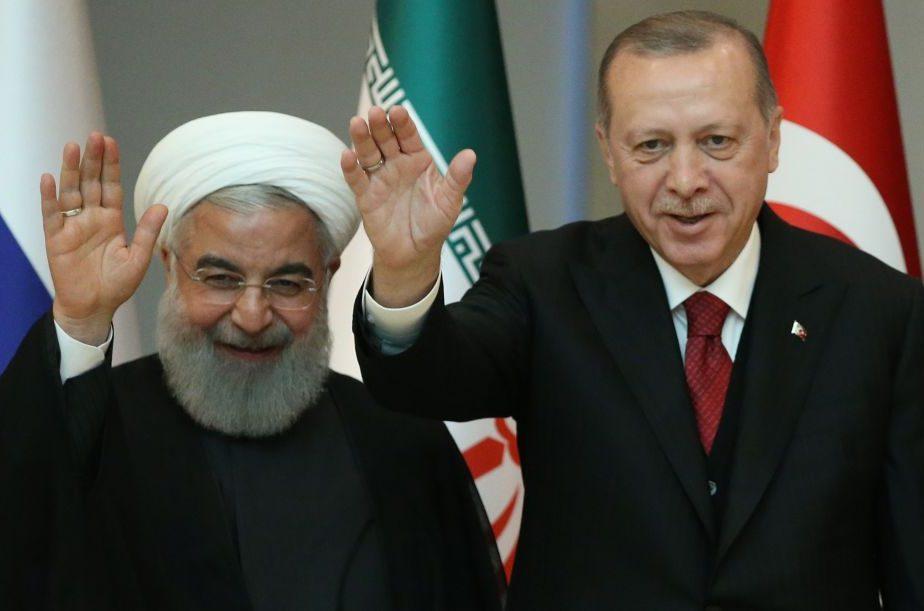
Turkish and Iranian interests coincide in the fields of energy and trade, especially because of Turkey’s dependence on Iranian oil and gas and Iran’s imports of Turkish goods. The two countries also align in their shared antipathy towards the Saudi regime and in their opposition to Kurdish separatism, which threatens the territorial integrity of both Turkey and Iran.
Turkey’s purchase of Iranian oil and Iran’s imports of Turkish products have been curtailed since 2018 by the sanctions reimposed on Iran by President Donald Trump, especially after April 2019 when the US rescinded the waiver given to Turkey and seven other major importers of Iranian oil. In 2019 the share of crude oil and oil products in Turkish imports from Iran decreased by 63% and Iran’s traditional trade surplus decreased by 79%. Simultaneously, the ‘maximum pressure’ exerted by Washington on Tehran reduced Iran’s capacity to buy Turkish goods.
However, both countries took this decline in their strides in the hope that things would improve with the end of the Trump presidency. Brighter prospects of America’s return to the nuclear deal with Iran (the Joint Comprehensive Plan of Action, which Trump withdrew the US from in 2018) and of the graduated removal of sanctions on Iran following the election of President Joe Biden are likely to see a rise in Turkish–Iranian economic interactions once again. Although they may not reach the level they had achieved before 2018, Iran is still likely to be a leading energy supplier of energy to Turkey, and Turkish goods will continue to corner a large share of the Iranian market because of geographic propinquity and low transport costs.
While the future of Turkey–Iran relations looks brighter in the economic sphere, the same can’t be said for the strategic arena. It’s true that both Tehran and Ankara are engaged in competing with Riyadh for influence in the Middle East. Saudi Arabia has considered Iran its mortal enemy since the Islamic Revolution of 1979. More recently, Turkey also started challenging Saudi Arabia’s quest for pre-eminence in the Arab world with its neo-Ottomanist policy that projects Turkey as the natural leader of the Sunni countries. This became very clear during the Saudi-led boycott of Qatar when Ankara supported Doha by airlifting supplies and troops to neutralise the threat it faced from Riyadh and its allies.
However, beneath the surface of these converging strategic interests lurk a number of problems that are now coming to the surface. First, when all is said and done, Turkey continues to be a member of NATO and therefore an ally of the United States, Iran’s primary nemesis. Although of late it has taken a defiant posture towards the US on several issues, including buying air defence systems from Russia and acting aggressively in Syria despite American reservations, Tehran can’t be sure that, if push comes to shove, Turkey will abandon its alliance with the US for the sake of Iran. In fact, Ankara’s decision to slash imports of Iranian oil under threat of American sanctions sends exactly the opposite message.
Again, in the past few years Turkey’s policies in Syria, where it opposes the regime of Bashar al-Assad, run contrary to Iran’s preferences as a principal supporter of the regime. In the past few months, Turkey has also made reconciliatory overtures to Israel and Saudi Arabia that should have Iran worried. But most important of all are Turkey’s policies towards the Caucasus and Central Asia, which are based on the premise of pan-Turkism that has a great deal of appeal for the Turkic populations of those regions. Russia and Iran have been rattled by this since they each consider the regions, which had been part of the Russian and/or Persian empire, as part of their spheres of influence.
The contradictions in Turkish and Iranian approaches to the Caucasus came to the fore with great force during the Azerbaijan–Armenia conflict of September–November 2020. Turkey supported Azerbaijan to the hilt, supplying it with arms that were a crucial factor in the Azeri victory in the war. Iran was not only ambivalent about the war but also looked with trepidation at the increase in Turkey’s popularity in the Turkic countries as a result of its support to Baku. The victory of Azerbaijan, which gave it more control over Armenian-held territory, has positioned it, and more importantly its ally Turkey, as an alternative, east–west conduit for trade in energy and other goods with Europe that would bypass the existing north–south routes dominated by Russia or Iran. Such an outcome will vastly decrease Moscow’s and Tehran’s importance to the Central Asian states and greatly add to Ankara’s importance.
Tehran is particularly worried that Turkey is exploiting its ethnic identity, which it shares with many states in Central Asia and the Caucasus, to expand its influence. President Recep Tayyip Erdogan’s recital, while attending a military parade in Baku to celebrate Azerbaijan’s victory over Armenia, of an Azeri nationalist poem that calls for reuniting two Iranian ethnic Azeri provinces with Azerbaijan annoyed the Iranian regime no end. This act was seen as not only fomenting trouble between Baku and Tehran but also stoking separatist sentiments among the Azeris in Iran, who form about a third of the Iranian population and are for the most part well integrated into the Iranian social fabric. In fact, Iran’s Supreme Leader Ayatollah Khamenei is an Azeri himself.
Elements of cooperation and potential conflict are thus closely intertwined in the Turkish–Iranian relationship. The leaders of both countries must carefully manage the intricate balance between the two to prevent any major escalation of tensions. Any tipping of the balance between these two major poles of power in the Middle East could add greatly to instability in an already volatile region.